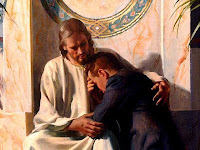The Gift of Reconciliation
Lent is a season of repentance,
renewal, and reconciliation with God. Each of today's readings speaks about
a new beginning, a turning point where God's people move from a place of
brokenness to restoration and reconciliation.
- Joshua 5:9-12 – Israel transitions from
slavery in Egypt to freedom in the Promised Land.
- 2 Corinthians 5:16-21 – Paul calls us to be
reconciled with God through Christ.
- Luke 15:1-3, 11b-32 – The Prodigal Son shows
us God’s mercy and love.
- Psalm 32 – The joy of forgiveness and
restored fellowship with God.
Each passage highlights God’s
amazing grace, urging us to accept His love and forgiveness and to extend
the same to others.
I. The Reproach of the Past is
Removed (Joshua 5:9-12)
A. A New Beginning for Israel
- God tells Joshua:
"Today I have rolled away
the reproach of Egypt from you." (Joshua 5:9)
- Israel had been in slavery for centuries and
then wandered in the wilderness for 40 years.
- Now, they have entered the Promised Land,
and their past shame is erased.
B. No More Manna – A New
Provision
- For 40 years, God provided manna in the
wilderness.
- Now, they eat from the fruit of the land,
signaling a new season of self-sufficiency under God’s blessings.
- Are there sins or burdens from the past that
we still carry?
- Lent is a time to allow God to remove our
reproach and give us a fresh start.
II. Becoming a New Creation in
Christ (2 Corinthians 5:16-21)
A. Seeing People Through
Christ’s Eyes
- Paul writes:
“From now on, we regard no one
from a worldly point of view.” (2 Cor. 5:16)
- When we come to Christ, we no longer see people
based on their past but with the eyes of grace.
B. Reconciliation Through
Christ
- Paul declares:
“If anyone is in Christ, he is
a new creation; the old has gone, the new has come!” (2 Cor. 5:17)
- Sin separates us from God, but through Christ,
we are reconciled and called to bring others to Him.
- Have we truly accepted God’s gift of
reconciliation?
- Do we extend this forgiveness and reconciliation
to others?
III. The Parable of the
Prodigal Son (Luke 15:1-3, 11b-32)
This parable illustrates God’s
extravagant love through three main characters:
A. The Prodigal Son – A Story
of Sin and Repentance
- The younger son rebels, wastes his
inheritance, and falls into despair.
- When he realizes his mistake, he says:
“I will arise and go to my
father and say, ‘Father, I have sinned against heaven and before you.’”
(Luke 15:18)
- His return symbolizes true repentance—turning
away from sin and returning to God.
B. The Loving Father – A
Picture of God’s Mercy
- The father runs to meet his son—an act of
deep love and grace.
- Instead of punishment, he gives him a robe, a ring,
and a feast!
- This reflects how God rejoices when we return to
Him.
C. The Older Brother –
Struggling with Grace
- The elder brother is angry and refuses to
join the celebration.
- He represents those who struggle to forgive and
accept God’s mercy for others.
- The father gently reminds him:
“Everything I have is yours.”
(Luke 15:31)
- Do we see ourselves in the Prodigal Son,
needing to return to God?
- Or are we like the elder brother, struggling
to forgive?
IV. The Joy of Forgiveness
(Psalm 32)
A. The Burden of Sin
- David describes the weight of unconfessed sin:
“When I kept silent, my bones
wasted away through my groaning all day long.” (Psalm 32:3)
B. The Freedom of Forgiveness
- But when he confesses, he experiences joy:
“Blessed is the one whose
transgressions are forgiven.” (Psalm 32:1)
- Are we holding onto guilt or unforgiveness?
- True peace comes when we confess our sins and
accept God’s mercy.
Returning to the Father’s Love
The theme of restoration and
reconciliation runs through all these passages:
- God removes our reproach (Joshua 5:9-12).
- We are made new in Christ (2 Corinthians
5:16-21).
- The Father welcomes us back (Luke 15:1-3,
11b-32).
- Forgiveness brings joy (Psalm 32).
Lent is a season to return to
God, to be reconciled through Christ, and to extend that same
love and mercy to others.
Challenge:
- Are we willing to leave our past behind and
embrace the new life God offers?
- Have we fully accepted God's forgiveness, or
are we still carrying guilt?
- How can we extend God’s mercy to others,
even those who have wronged us?
Prayer:
"Heavenly Father, we
thank You for Your mercy and grace. Help us to return to You with repentant
hearts, to receive Your forgiveness, and to share that love with others. May we
live as new creations in Christ, always seeking reconciliation and unity. In
Jesus’ name, Amen."

No comments:
Post a Comment